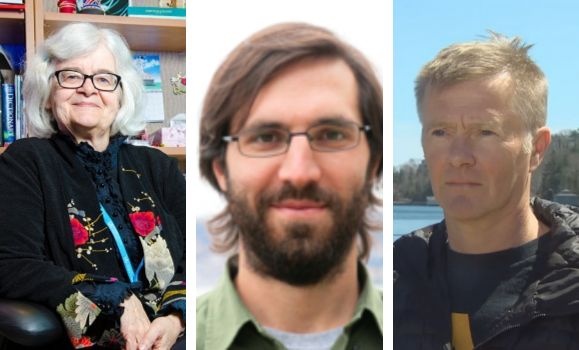What do vaccines, warming oceans, and plastic pollution all have in common? Aside from having a pronounced impact worldwide in their own unique ways, they also represent the areas of expertise of three current Dalhousie University faculty members named to the prestigious 2024 Highly Cited Researchers list from Clarivate, a leading data analytics company.
Dr. Noni MacDonald of the Faculty of Medicine’s Department of Pediatrics and two Faculty of Science researchers, Dr. Eric Oliver of the Department of Oceanography and Dr. Tony Walker of the School for Resource and Environmental Studies, made this year’s list of Highly Cited Researchers, along with former faculty member Dr. Randall Martin. Drs. MacDonald and Walker also appeared on 2023's list.
Released in November, Clarivate’s 2024 list recognized 6,636 Highly Cited Researchers from over 1,200 institutions in 59 nations and regions. Canadian institutions had 206 researchers, with the United States possessing the largest number of researchers worldwide (2,507 - a 36.4 per cent share). The list is compiled using data from the Web of Science citation index, along with qualitative analysis from Clarivate’s Institute for Scientific Information.
Below, Dal’s current Highly Cited Researchers describe the lasting impact of a particularly influential research paper in their own words.
Dr. Noni MacDonald
Most influential paper: “Vaccine hesitancy: Definition, scope and determinants” (published August 2015 in Vaccine)
Citations to date: 3,309
Why it resonates: “This is the paper that drew attention to and started the field of research into factors that affect vaccine acceptance and why some are hesitant. It summarized the definition of a working group on vaccine hesitancy of the World Health Organization. When I wrote this paper, I had no idea it would be cited so much. While I might rewrite that definition now, the core elements are still noteworthy almost 10 years later. In other words, this paper is "shorthand " for some very complex ideas and concepts that have stood the test of time. This paper gets cited in social science, health, ethics, medical and other research in areas where vaccine hesitancy/acceptance are research topics.”
Dr. Eric Oliver
Most influential paper: “Longer and more frequent marine heatwaves over the past century” (published April 2018 in Nature Communications)
Citations to date: 1,215
Why it resonates: “Our study was the first to document the changes in marine heatwaves, which are periods of prolonged extreme ocean temperatures. We found that globally, since the early 20th century, the marine heatwave frequency and duration have increased by 34 per cent and 17 per cent, respectively, leading to a 54 per cent increase in total annual marine heatwave days. We found that these changes were largely driven by rising ocean temperatures and so we can expect the trend to continue under global warming. Marine heatwaves are studied in a diversity of disciplines including physical oceanography, climate science, marine ecology, fisheries science, and even management and policy. This paper was written and presented, and the underlying marine heatwave definition from an earlier paper was developed, in a way that is accessible and useful across these disciplines.”
Dr. Tony Walker
Most influential paper: “International policies to reduce plastic marine pollution from single-use plastics (plastic bags and microbeads): A review” (published May 2017 in Marine Pollution Bulletin)
Citations to date: 705
Why it resonates: “I’m proud of this paper, co-authored with former Master of Resource and Environmental Management (MREM) student Dirk Xanthos based on a directed-reading elective. Students in the MREM course-based program typically do not publish research papers, yet the paper was nominated for an Atlas Award by Elsevier Editors-in-Chiefs and made permanently open access. Each month, from all published research across Elsevier’s 2,500+ journals, a small number of articles are nominated for the Atlas Award. The Atlas Award identifies articles that with limited resources, when implemented, could impact society around the globe, research for a better world. It was the most downloaded paper in the journal for three consecutive years. It is currently the fifth most-downloaded paper.”

